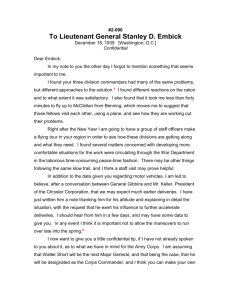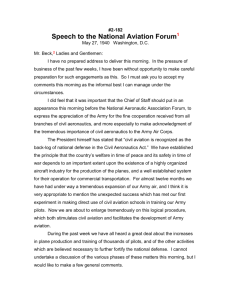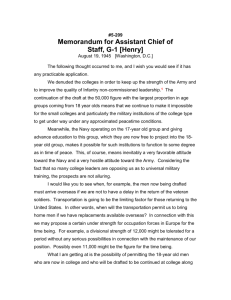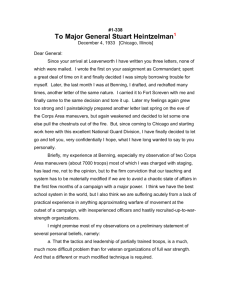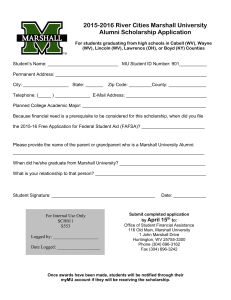2-109 - George C. Marshall Foundation
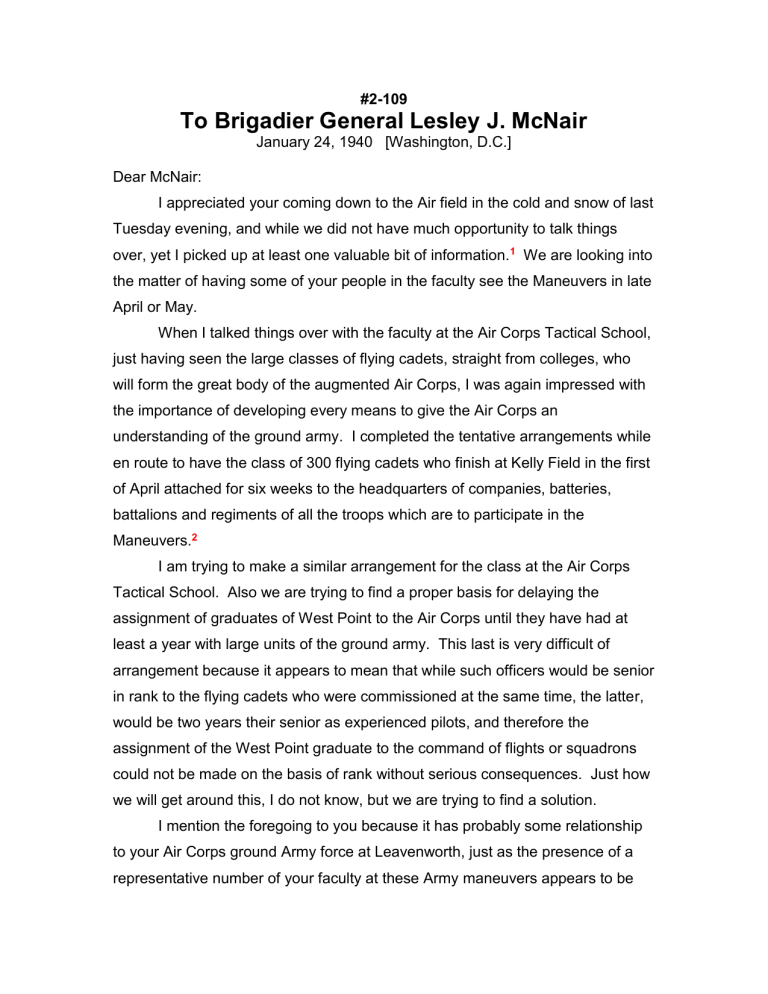
#2-109
To Brigadier General Lesley J. McNair
January 24, 1940 [Washington, D.C.]
Dear McNair:
I appreciated your coming down to the Air field in the cold and snow of last
Tuesday evening, and while we did not have much opportunity to talk things over, yet I picked up at least one valuable bit of information.
1 We are looking into the matter of having some of your people in the faculty see the Maneuvers in late
April or May.
When I talked things over with the faculty at the Air Corps Tactical School, just having seen the large classes of flying cadets, straight from colleges, who will form the great body of the augmented Air Corps, I was again impressed with the importance of developing every means to give the Air Corps an understanding of the ground army. I completed the tentative arrangements while en route to have the class of 300 flying cadets who finish at Kelly Field in the first of April attached for six weeks to the headquarters of companies, batteries, battalions and regiments of all the troops which are to participate in the
Maneuvers.
2
I am trying to make a similar arrangement for the class at the Air Corps
Tactical School. Also we are trying to find a proper basis for delaying the assignment of graduates of West Point to the Air Corps until they have had at least a year with large units of the ground army. This last is very difficult of arrangement because it appears to mean that while such officers would be senior in rank to the flying cadets who were commissioned at the same time, the latter, would be two years their senior as experienced pilots, and therefore the assignment of the West Point graduate to the command of flights or squadrons could not be made on the basis of rank without serious consequences. Just how we will get around this, I do not know, but we are trying to find a solution.
I mention the foregoing to you because it has probably some relationship to your Air Corps ground Army force at Leavenworth, just as the presence of a representative number of your faculty at these Army maneuvers appears to be
absolutely essential if Leavenworth is to retain its prestige as the teacher of division and corps tactics, logistics and technique. Otherwise, the student will be the veteran and the member of the faculty will be the novice. I am dictating this off-hand as the thoughts occur to me, so treat it as more or less of a casual conversation.
I wish you would have the doctor who examined Major Adams write me personally a statement of his condition, and with the probabilities, in terms understandable to me. The two doctors on his medical board told me Tuesday night of the result of their examination, but I paid very little attention to that as
Major Adams was listening in on what they said. Specifically, I am wondering if it would not h ave been better to have put him on at least two months’ sick leave instead of just one. In a sense I am trying to protect him against himself, because with these important Army activities coming to a head and the press of business here in Washington, he quite evidently feels deeply embarrassed at delaying his reporting for duty.
3
I hope you conveyed my apologies to Mrs. McNair for allowing her to prepare a dinner for us, and then not reporting to enjoy it. Please tell her I am sorry to have been the cause of so much trouble.
Faithfully yours,
Document Copy Text Source: George C. Marshall Papers, Pentagon Office Collection, Selected
Materials, George C. Marshall Research Library, Lexington, Virginia.
Document Format: Typed letter.
1. Marshall was forced to leave Fort Leavenworth by the onslaught of a snowstorm after a one hour visit on January 16, 1940.
2. Marshall stopped at the Air Corps Tactical School, Maxwell Field, Alabama, en route home from his inspection of the western maneuvers on January 22, 1940. Prior to that visit, he had inspected the Advanced Flying School at Kelly Field, Texas, on January
20.
3. Physicians at Fort Leavenworth recommended to McNair that Major Claude M. Adams receive one month of sick leave. (Memorandum to the Commandant, Command and
General Staff School, January 27, 1940, GCMRL/G.C. Marshall Papers [Pentagon
Office, Selected].)
Recommended Citation: The Papers of George Catlett Marshall, ed.
Larry I. Bland, Sharon
Ritenour Stevens, and Clarence E. Wunderlin, Jr.
(Lexington, Va.: The George C. Marshall
Foundation, 1981 – ). Electronic version based on The Papers of George Catlett Marshall, vol. 2 ,
“We Cannot Delay,” July 1, 1939-December 6, 1941 (Baltimore and London: The Johns Hopkins
University Press, 1986), pp. 144-145.
